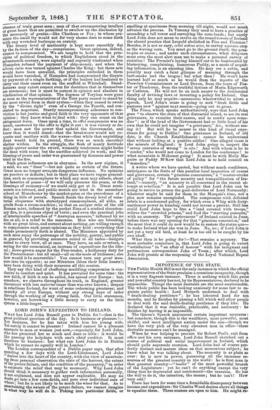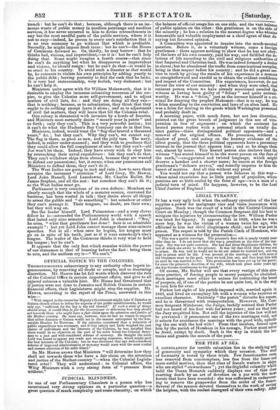IMPOTENCE OF THE STATE.
Tan Public Health Bill is not the only instance in which the official representatives of the State proclaim a conscious incapacity, though it is a very flagrant instance. There is nothing which this great and powerful country has not, by its Representatives, declared to be impossible. Things the most desirable are the most unattainable. The whole public has been looking anxiously for some law to re- gulate public health : Lord Morpeth undertook to deal with "death-dealing pestilence " ; he has laboured hard for ten months, and he finishes by passing a bill which will allow people to deal with the said death-dealing pestilence if they like. He declared that it was desirable, practicable, and necessary : he finishes by leaving it as impossible. The Queen's Speech announced certain important measures : but somehow, though this is the wealthiest, most powerful, most skilful, and most intelligent nation under the sun—though we have the very pick of the very cleverest men in office—these desirable measures can't be managed. When he was helping to procure Sir Robert Peel's exit from office and his own entrance, Lord John Russell sketched out a course of political and social improvement in Ireland, which should quite supersede coercion. Lord John had of course per- fectly distinct and mature ideas on that momentous subject; he knew what he was talking about. The necessity is as plain as ever : he is now in power, possessing all the immense re. sources of the greatest country in the world : he is first man in that greatest country—" leader" of the most powerful branch of the Legislature : yet he can't do anything except the very thing that he deprecated and condemned—the coercion. He has the will to do it, the intention, the means ; but he can't ! How very odd ! There has been for some time a formidable discrepancy between income and expenditure: Sir Charles Wood desires above all things to equalize them. Three courses are open to him. He might re- trench : but he can't do that ; because although there is an im- mense waste of public money in needless patronage and needless services, it has never occurred to him to devise retrenchments in any but the most needful parts of the public services, where it is not so easy—indeed, he proves to every, one's satisfaction that it is no true economy to go without that which is profitable. Secondly, he might impose fresh taxes : but he can't—the House of Commons frowned so. Or, thirdly, he may borrow : that he thinks bad, vicious, and improvident,—as it is : but he can't help doing that. Some might imagine a fourth course—that since he can't do anything but what he disapproves as improvident and vicious, be should resign : but he can't do that—it would be so cruel to his country. To avoid such a disaster as that would be, he consents to violate his own principles by adding yearly to the public debt ; leaving posterity to find the cash that he lacks. It is very bad statesmanship, very foolish, very dishonest : but be can't help it.
Ministers quite agree with Sir William Molesworth, that it is desirable to employ the immense colonizing resources of the em- pire, to give the Colonies more self-government, and to adjust matters of civil lists, &c. : and they are doing all they can— that is nothing; because, as to colonization, they think that they ought to do nothing except leave it alone; and as to adjustment of civil list matters, they will leave that till the Colonies rebel.
One colony is threatened with invasion by a horde of fanatics, and Ministers most earnestly desire " mounr pour la patrie " and so forth ; only they can't. This is a very powerful nation; but it can't do what the Hudson's Bay Company can do in that line.
Ministers, indeed, would trust the "flag that braved a thousand years," &c. ; but they can't. Why they can't, we cannot say. The flag is there, as good as new, and the jolly tars. The navy, i indeed, s rather under-manned ; and they wish to goodness that they could allow the full complement of men: but they can't—old Joe won't let them. Indeed, they have every wish to obey him by retrenching their naval expenditure : but they can't do that. They can't withdraw ships from abroad, because they are wanted to defend our possessions; but, it seems, when our possessions call Ministers to defend them, they can't do it. The West Indies are going to rack and ruin ; how to save them occupies the incessant attention " of Lord Grey, Mr. Hawea, Lord John Russell, Lord Lansdowne, Mr. Charles Buller, Sir James Stephen, and all the rest : but somehow they can't do it ; So the West Indies must go. Parliament is very conscious of its own defects : Members see clearly enough that the whole of a monster session, convened for business, has been wasted in talk : they desire above all things to arrest the gabble and "do something": but somehow or other they can't manage it. Their tongues, no doubt, are their own; but they will wag on. See the leader himself. Lord Palmerston—and a very clever fellow he is—astounded the Parliamentary world with a speech that lasted only nine minutes! Lord John is charmed : "See," he cries, "what that gentlemen has done ! here is an admirable example": but yet Lord John cannot manage these nine-minute speeches. Not at all : when once he begins, his tongue must go on in spite of his teeth, just as if it were somebody's else's tongue. The leader of the Commons thinks it very wise to hold his tongue ; but he can't. It appears that the only feat which remains within the power of our statesmen is that of boasting- before the fact : bring them to acts, and the uniform cry is—" We can't."



























 Previous page
Previous page